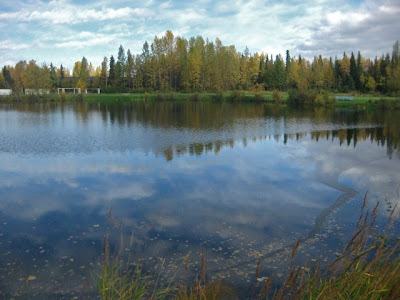"This election will present two very clear choices for the people of Alaska: Do we want to be an owner state or do we want to be an owned state?
Do we want to go back to the failed policies of 30 years that have left us with little to show or do we want a new direction, a new vision where we follow our constitution and get the maximum benefit for our resources?
[Note: I always try to be objective and even-handed in my blog posts, but sometimes, there is only one right choice. This really is about the richest companies in the world trying to snatch back $2 billion in taxes a year from the people of Alaska. They're trying to get back to where things were before the FBI stepped in to expose the corruption in Juneau over oil taxes. They've waited a few years and now they're back at it, buying legislators to pass their tax cut. Those opposed to the tax in the Senate were both Republicans and Democrats. Watch the video.]

This is the video tape that every Alaskan voter should see before the election. Senator Bill Wielechowki lays out the argument against the Governor's plan to cut the oil companies' taxes by $2 Billion (yes with a B) per year.
For 30 years we had a policy of low or no taxes on the North Slope. The philosophy was, low taxes will lead to more investment, low taxes will lead to more jobs, low taxes will lead to more oil. [Thus ?] we have a 30 year experiment. How did it work?
It failed. For 30 years we peaked at 2.1 million barrels a day of oil. 30 years later in 2006 with a zero percent tax rate on 15 out of 19 fields we had 740,000 barrels flowing down the pipeline. The policy failed. Jobs declined. Investment declined. Production declined. Do we want to go back to that failed policy? Are you willing to work to insure that we don’t go back to that failed policy?
They hate him because he has fought hard against the Governor's bill and because he's able to articulate clearly and passionately why it's all wrong. There's no vague ideology and empty promises of more jobs. It's full of facts that show that there is no good reason for Alaskans to give any money to the oil companies and plenty of reasons not to. Most of his short speech is quoted here. It's heavy with facts.
We have a new policy in place. It’s called ACES. It’s working and there are two people I need to pay homage to . . . two of the legislators who stood up and said enough is enough and filed the first oil tax bill are with us today. It is Senator Hollis French and Representative Les Gara.
So how has that new policy worked?
Since we passed ACES, we’ve had all time highs in jobs every year since the bill passed. We’ve had all time highs in investment every year since the bill passed. We’ve had all time highs in the number of companies doing business in Alaska every year since the bill passed.
We have more people working on the North Slope today than ever in the history of the state. We have more invested in the North Slope than ever in the history of the state. We have a 253 percent increase in the number of companies doing business in Alaska in the oil patch. I’d say it’s working pretty well, wouldn’t you?
I remember I was running six years ago and people were saying, “Are you going to raid the Permanent Fund? Are you going to have an income tax? Or a sales tax? Because the failed policies left us with nothing.
Norway came to Alaska and studied our Permanent Fund.
They started their Permanent Fund 19 years after ours. They did it with less oil than ours. Our Permanent Fund is worth 42 billion dollars. Norway’s permanent fund is worth 600 billion dollars. We have lost hundreds of billions of dollars because of the failed policies of 30 years. We’re not going back to that are we?
But I recommend you listen to the video. Wielechowski isn't some party hack. He's a regular guy, a Mr. Smith Goes to Juneau, who looked around and saw how bad it was and got angry. He's taken a stand that makes him a prime target for the oil companies who are taking advantage of Citizens United to get their $2 billion gift from their delivery boy in the Governor's Mansion in Juneau. If they spent $100 million and succeeded in getting a Senate that supports their $2 billion a year tax cut, it would be the best investment in Alaska history.
Watch the video and see why oil company execs hate him so much. See how clearly and well he exposes the fraud the Governor is trying to commit against the people of Alaska.
We have villages in Alaska without running water or sewage systems, but our Governor, a former ConocoPhillips lobbyist, wants to give back $2 billion a year to some of the richest companies in the world. The governor is supposed to represent all the people of Alaska. We've had governors like Hickel and Hammond, even Palin, who have stood up to the oil companies. But he wants to give them this money and in return we get vague mantras, but no promises, about jobs, jobs, jobs.
The video was made Saturday, September 22, 2012 at a gathering of people in support of Save Our Oil and supported by a resurrected Alaska Backbone - the bi-partisan group that formed when ConocoPhilips bought ARCO. Backbone demanded the state and feds hold out for better conditions before the deal was approved.
The key to preventing this giveaway is to elect enough coalition friendly senators to continue to block the oil companies' assault on the people of Alaska.
Who are the Senators in the Bi-Partisan Working Group? From the Backbone website:
Senator Bill Wielechowski • Senator Bert Stedman • Senator Joe Thomas • Senator Joe Paskvan • Senator Linda Menard • Senator Lesil McGuire • Senator Johnny Ellis • Senator Gary Stevens • Senator Kevin Meyer • Senator Don Olson • Senator Hollis French • Senator Bettye Davis • Senator Tom Wagoner • Senator Lyman Hoffman • Senator Dennis Egan • Senator Al Kookesh
The Alaska Redistricting Board whittled away at the districts as much as the Supreme Court would let them.
Coalition Incumbents running against each other:
- Senators Kookesh (Southeast) and Stedman (Southeast) are running against each other in Southeast, so one of them will be gone.
- Senator Joe Thomas (Fairbanks) was redistricted so that he is facing Senator John Coghill (Fairbanks).
Coalition Incumbents lost in the primaries to anti-coalition Republicans:
- Senators Linda Menard (Palmer)
- Tom Wagoner (Kenai).
Redistricted into more conservative districts:
- Senator Joe Paskvan (Fairbanks).
- Senator Bettye Davis (Anchorage).
- Senator Bill Wielechowski (Anchorage).
- Senator Hollis French (Anchorage).
New District with no Senate Incumbent (Anchorage)
- Senate District H: Democratic Representative Berta Gardner v. Republican Don Smith
| Sen Seat |
Republican | Democrat (unafilliated for Seat N) |
| A | John B. Coghill Jr. (Republican) P.O. Box 58003 Fairbanks, AK 99711 Phone: (907) 488-7886 Candidate's web site: http://www.johncoghill.com |
Joe J. Thomas (Democrat)* 879 Vide Way Fairbanks, AK 99712 Phone: (907) 457-6710 Candidate's web site: http://www.alaskansforjoethomas.com |
| B | Pete Kelly (Republican) 511 East Slater Drive Fairbanks, AK 99701 Candidate's web site: http://www.petekellyforsenate.co |
Joe Paskvan (Democrat)* 3275 Riverview Drive Fairbanks, AK 99709 Phone: (907) 474-0551 |
| C | Click Bishop (Republican)**(see comments) 3365 Sandvik Rd. Fairbanks, AK 99709 Phone: (907) 479-3969 e-mail: click@clickbishop.com Candidate's web site: http://www.clickbishop.com |
Anne Sudkamp (Democrat)** P.O. Box 83304 Fairbanks, AK 99708 Phone: (907) 479-5192 e-mail: anne.sudkamp@gmail.com Candidate's web site: www.annesudkamp.com |
| D | Mike J. Dunleavy (Republican) 1830 E Parks Hwy, Ste A-113, PMB #550 Wasilla, AK 99654 Phone: (907) 841-0399 |
|
| E | Charles R. "Charlie" Huggins (Republican) 3375 N Edgewater Drive Wasilla, AK 99623 Phone: (907) 373-6419 e-mail: reelectcharliehuggins@gmail.com Candidate's web site: www.charliehuggins.com |
Susan M. Parsons Herman (Democrat)** 3101 E. Palmdale Dr. Wasilla, AK 99654 Phone: (907) 376-8281 |
| F | Fred J. Dyson (Republican) 12239 Lugene Lane Eagle River, AK 99577 Phone: (907) 694-3744 |
Martin J. Lindeke (Democrat)** 16111 Cline Street Eagle River, AK 99577 Phone: (907) 354-4402 |
| G | Bob Roses (Republican) 8200 E. 2nd Avenue Anchorage, AK 99504 Phone: (907) 350-0684 Candidate's web site: http://www.bobroses.com |
Bill Wielechowski (Democrat)* 1300 Farrow Circle Anchorage, AK 99504 Phone: (907) 242-1558 e-mail: wielechowskiforsenate@gmail.com Candidate's web site: www.wielechowski.org |
| H | Don Smith (Republican) 2121 Tudor Hills Court Anchorage, AK 99507 Phone: (907) 529-6170 |
Berta Gardner (Democrat)** 1405 Matterhorn Way Anchorage, AK 99508 Phone: (907) 274-1334 |
| I | Paul D. Kendall (Republican) 1342 Hyder Street Anchorage, AK 99501 Phone: (907) 222-7882 e-mail: pauldkendall@yahoo.co |
Johnny Ellis (Democrat)* 1231 W. Northern Lights #533 Anchorage, AK 99503 Phone: (907) 223-7724 |
| J | Bob Bell (Republican) P.O. Box 92520 Anchorage, AK 99509-2520 Phone: (907) 272-5160 |
Hollis S. French II (Democrat)* 2640 Telequana Drive Anchorage, AK 99517 Phone: (907) 244-7135 e-mail: info@frenchforstatesenate.com Candidate's web site: www.Frenchforstatesenate.com |
| K | Lesil L. McGuire (Republican)* 2022 Kimberly Lynn Cir Anchorage, AK 99515 Candidate's web site: http://www.lesilmcguire.com/ |
Roselynn Cacy (Democrat)** 11930 Johns Road Anchorage, AK 99515 Phone: (907) 344-1261 |
| L | Kevin Meyer (Republican)* 4020 Winchester Loop Anchorage, AK 99507 Phone: (907) 349-6511 Candidate's web site: http://www.senatormeyer.com |
Jacob O. "Jake" Hale (Democrat)** 3561 Hollyberry Cir Anchorage, AK 99507 Phone: (907) 351-6762 |
| M | Anna I. Fairclough (Republican) P.O. Box 771112 Eagle River, AK 99577 Phone: (907) 694-7090 Candidate's web site: http://www.annafairclough.com |
Bettye Davis (Democrat)* 2240 Foxhall Drive Anchorage, AK 99504 Phone: (907) 337-2034 |
| N | Catherine A. "Cathy" Giessel (Republican) 12701 Ridgewood Road Anchorage, AK 99516 Phone: (907) 345-5470 e-mail: Cathy@Giessel.org Candidate's web site: www.CathyGiessel.com |
Ron Devon (Non-Affiliated) - ** Nominating Petition Candidate 6520 Italy Circle Anchorage, AK 99516 Phone: (907) 301-1601 |
| O | Peter A. Micciche (Republican) P.O. Box 1544 Soldotna, AK 99669 Phone: (907) 262-6165 |
|
| P | Sen. Egan* is the only legislator not up for election this year. |
|
| Q | Bert K. Stedman (Republican)* 118 American St. Sitka, AK 99835 Phone: (907) 821-2378 e-mail: bertstedman@yahoo.com Candidate's web site: www.stedmanforsenate.com |
Albert M. Kookesh (Democrat)* P.O. Box 91 Angoon, AK 99820 Phone: (907) 788-3615 e-mail: amkookesh@gmail.com |
| R | Gary L. Stevens (Republican)* P.O. Box 201 Kodiak, AK 99615 Phone: (907) 486-4205 |
Robert J. Henrichs (Democrat)** P.O. Box 1000 Cordova, AK 99574 Phone: (907) 424-7783 |
| S | Lyman F. Hoffman (Democrat)* P.O. Box 763 Bethel, AK 99559 Phone: (907) 543-3583 |
|
| T | Allen Minish (Republican) P.O. Box 118 Chitina, AK 99566 Phone: (907) 823-2280 |
Donald C. "Donny" Olson (Democrat)* P.O. Box 241248 Anchorage, AK 99524 Phone: (907) 240-3795 |
| *Were Coalition Members in last Legislative Session, but if Republicans gain majority, not guaranteed next time **Likely Coalition Members in future Legislsative Session |
||
Actually, Bill Wielechowki is a pretty nice guy, and maybe the oil company people actually like him personally and hate someone else more. But they sure don't like his strong stand against changing the taxes and would love to see his opponent win.
[UPDATE 9/26/12: Someone emailed me this link to Alaskans United to Stop Our Oil Wealth Giveaway (that's a mouthful) for more information.













